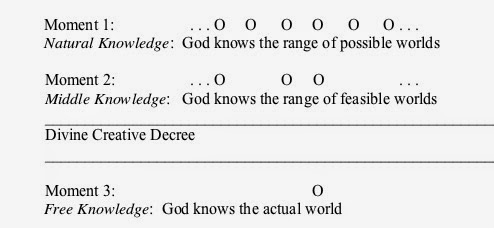Response to Nathanael Taylor on Molinism
Nathanael P. Taylor is posting a series on Molinism ( link ) Here’s his description of Molinism. In Molinism, it’s been true through all eternity past that if I were in a circumstance C, then I would have faith in Christ. Logically, this means that it was true prior to God choosing to create this actual world. However, this just happens to be true—it is a contingent truth. In other words, something different could have been true from all eternity past. The counterfactual that if I were in a circumstance then I would have faith in Christ could have either been truth or false. Suppose this counterfactual statement turned out true—you might ask, “What makes this counterfactual true or false?” And the answer is that nothing makes it true. The counterfactuals of creaturely freedom are just true from all eternity past and, oddly, nothing makes them true. God can’t make them true because that would mean God has control over the counterfactuals of creaturely freedom, resembling Calvinism....
